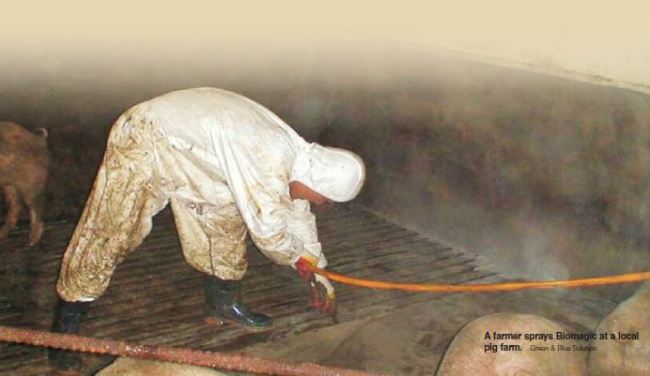Faced with tightened government regulations on the environment and increased competition from cheap imports under a number of free trade pacts, livestock farmers have been struggling to support their businesses.
Demand for livestock products, on the other hand, has been growing, as more people in developing countries become able to afford meat. According to recent market data, meat production capacity is expected to double by 2050, reaching 465 million metric tons a year from 229 million metric tons in 2001.
 |
A farmer sprays Biomagic at a local pig farm. (Green & Blue Solution) |
Behind the rapid growth of the livestock market, the industry faces tougher regulations each year. According to a joint study by the Organization for Economic Cooperation and Development and the Food and Agriculture Organization, around 14 to 18 percent of greenhouse gas emissions come from farm animals and their excrement, which is more than the emissions from automobiles. The OECD also noted that animal excrement seriously pollutes the water and soil around farming sites.
For farmers, however, growing environmental awareness and regulations impose a huge financial burden.
In addition to the rising costs, public complaints about bad odors from livestock farms have put the industry under pressure.
Pig farms in Korea are no exception.
The size of the local pork market reached 6.6 trillion won ($5.8 billion) in 2014, accounting for 14.7 percent of overall agriculture products sales, or 35.2 percent of all livestock products. The demand for pork is still high in Korea, but local farmers struggle to compete with growing pork imports and face complaints from nearby residents.
To help farmers stay competitive, a South Korean venture firm has developed a bio-enzymatic odor eliminator.
Green & Blue Solution, based in Goyang, Gyeonggi Province, said its product, Biomagic, contains enzymes that boost the proliferation of micro-organisms in excrement and accelerates the breakdown of the waste. It reduces toxic chemicals in the excrement and unpleasant odors that come from it the company’s president Yoo Tae-chul said.
Biomagic, made up of extracts from orange, papaya and lime, can effectively reduce levels of ammonia and hydrogen sulfide, which are the sources of bad smells, as well as pollutants such as CO2, potassium and nitrogen compounds.
“The combination of enzymes in Biomagic carries out catalytic action, hydrolysis and oxidation, and can repeat these actions millions of times to reduce bad smells by more than 90 percent,” Yoo said.
As Biomagic reduces odors and toxins from excrement, it improves the working environment for farmers, G&B Solution said. The firm conducted a test at Cottonwood Farm, in Craigville, Indiana, which has some 5,000 pigs, and reported that Biomagic helped reduce the pigs’ mortality rate by 70 percent.
The firm has also seen reductions in toxic gas concentrations and mortality rate reductions from 30 percent to below 2 percent at some domestic livestock farms that use Biomagic.
Starting with around 30 livestock farms, G&B Solution commercialized Biomagic in 2015, and currently supplies to about 260 farms nationwide. The company expects more orders from local governments and from countries that have difficulty dealing with animal waste.
“It is very important that companies deliver value to society over profits, if we are to make a better and cleaner world for everybody,” the firm’s president said.
By Shim Woo-hyun (
ws@heraldcorp.com)







![[Today’s K-pop] Blackpink’s Jennie, Lisa invited to Coachella as solo acts](http://res.heraldm.com/phpwas/restmb_idxmake.php?idx=644&simg=/content/image/2024/11/21/20241121050099_0.jpg)
